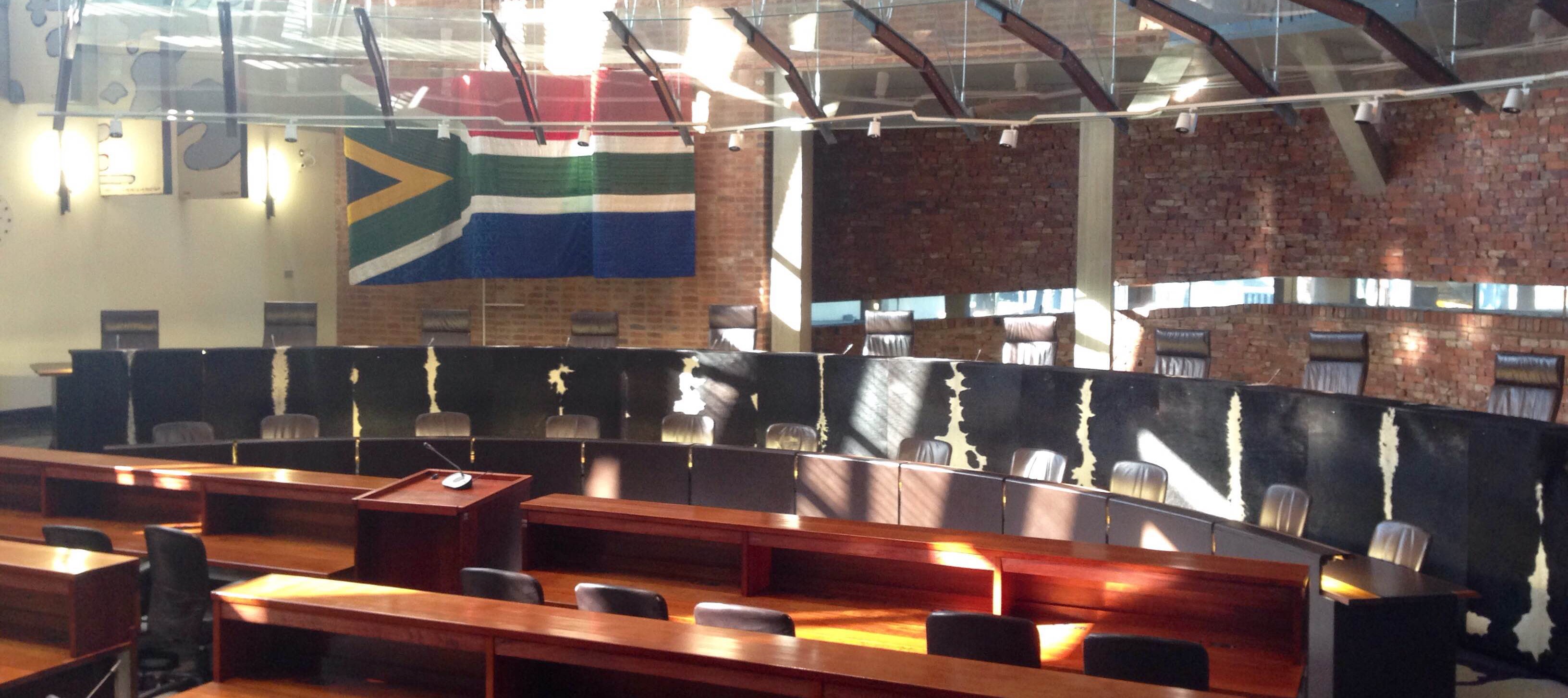For immediate release: 14 October 2016
International and local NGOs, as friends of the court, file submissions before the Constitutional Court in the Al-Bashir Case
On 28 September 2016, the Peace and Justice Initiative and the Centre for Human Rights (“PJI/CHR”), represented by the Legal Resources Centre (“LRC”), were jointly admitted as amici curiae (friends of the court) in the matter of the Minister of Justice and Constitutional Development and Others v. Southern Africa Litigation Centre (CCT 75/16) (“Al-Bashir Case”) before the Constitutional Court of South Africa (“Court”). Yesterday, on 13 October 2016, PJI/CHR filed joint heads of argument in this matter, which can be accessed here, with the aim of utilising PJI/CHR’s collective domestic and international law experience to assist the Court in reaching its decision.
The Al-Bashir Case concerns a June 2015 order of the High Court of South Africa directing South African authorities to arrest Sudanese President Omar Al-Bashir, who was attending an African Union Summit in Sandton, South Africa, at the time. President Al-Bashir was, and still is, subject to arrest warrants issued by the International Criminal Court (“ICC”) in connection with allegations of genocide, war crimes and crimes against humanity (including torture) committed in Darfur, Sudan. President Al-Bashir left South Africa without having been arrested.
In this case, the South African Government is appealing a March 2016 judgment of the South African Supreme Court of Appeal (“SCA”), which held that President Al-Bashir, on the basis of domestic law, did not enjoy incumbent Head of State immunity. The SCA held that he should have been arrested by South African authorities during his visit.
In their joint heads of argument, PJI/CHR argue that although the outcome of the SCA’s judgment was correct, it had the effect of creating a conflict between international law and South African domestic law on the issue of incumbent Head of State immunity. On the basis of United Nations Security Council (“UNSC”) Resolution 1593 (2005) and the Convention on the Prevention and Punishment of the Crime of Genocide (1948) (“Genocide Convention”), President Al-Bashir did not enjoy incumbent Head of State immunity at international law, and thus there was no need to determine whether domestic law removed such immunity.
PJI/CHR submit that as a result of UNSC Resolution 1593 (2005), Sudan has become a de facto State party to the ICC’s Rome Statute (1998) for the purposes of the Darfur situation, and provisions of that treaty which remove incumbent Head of State Immunity apply to Sudan. PJI/CHR also submit that President Al Bashir’s immunity was removed pursuant to provisions of the Genocide Convention. Further, PJI/CHR contend that South African authorities act with the authority the ICC when they execute its arrest warrants; since he enjoys no immunity before the ICC, he also enjoys no immunity in South Africa.
Moreover, PJI/CHR argue that as President Al Bashir did not enjoy immunity, South Africa was under a positive obligation to arrest him and submit his case for prosecution before the ICC in accordance with provisions of the Convention Against Torture and Other Cruel, Inhuman or Degrading Treatment or Punishment (1984) and the Constitutional Court’s Zimbabwe Torture Docket Judgment, and Constitutional provisions concerning access to justice.
Accordingly, South African authorities should have arrested President Al-Bashir and facilitated his transfer to the ICC.
The hearing in this case is scheduled before the Constitutional Court of South Africa in Johannesburg on 22 November 2016.
Filings in this case can be accessed here:
- South African Government’s appeal
- Southern Africa Litigation Centre’s response
- First Amici Curiae (Professors John Dugard and Guénaël Mettraux)
- Second Amicus Curiae (Amnesty International Limited)
- Third Amici Curiae (Peace and Justice Initiative and Centre for Human Rights)
- Fourth Amicus Curiae (Helen Suzman Foundation)
ENDS
For more information please contact:
- Frans Viljoen (Director of the Centre for Human Rights) | viljoen@up.ac.za | +27 (0)73 393 4181
- Manuel Ventura (Director of the Peace and Justice Initiative) | manuel.ventura@peaceandjusticeinitiative.org
- Michael Power (Attorney, Legal Resources Centre) | michael@lrc.org.za
The Peace and Justice Initiative is a network of international criminal law professionals based in The Hague. Their aim is to encourage and assist in the national adoption of laws under which crimes against humanity, genocide and war crimes can be prosecuted and to provide expert technical assistance in such endeavours. PJI is registered as an NGO under Dutch law and has charitable status.
The Centre for Human Rights is based in the Faculty of Law at the University of Pretoria, South Africa since 1986. It is an academic department and a non-governmental organisation. Its key work includes working towards human rights education in Africa; raising a greater awareness of human rights; the wide dissemination of publications on human rights in Africa; the implementation of international law in Africa; and the improvement of the rights of women, people living with HIV, indigenous peoples, sexual minorities and other disadvantaged or marginalised persons or groups across the continent.
The LRC is an independent, non-profit, public interest law clinic based in Johannesburg, South Africa, which uses law as an instrument of justice to provide legal services for the vulnerable.

